

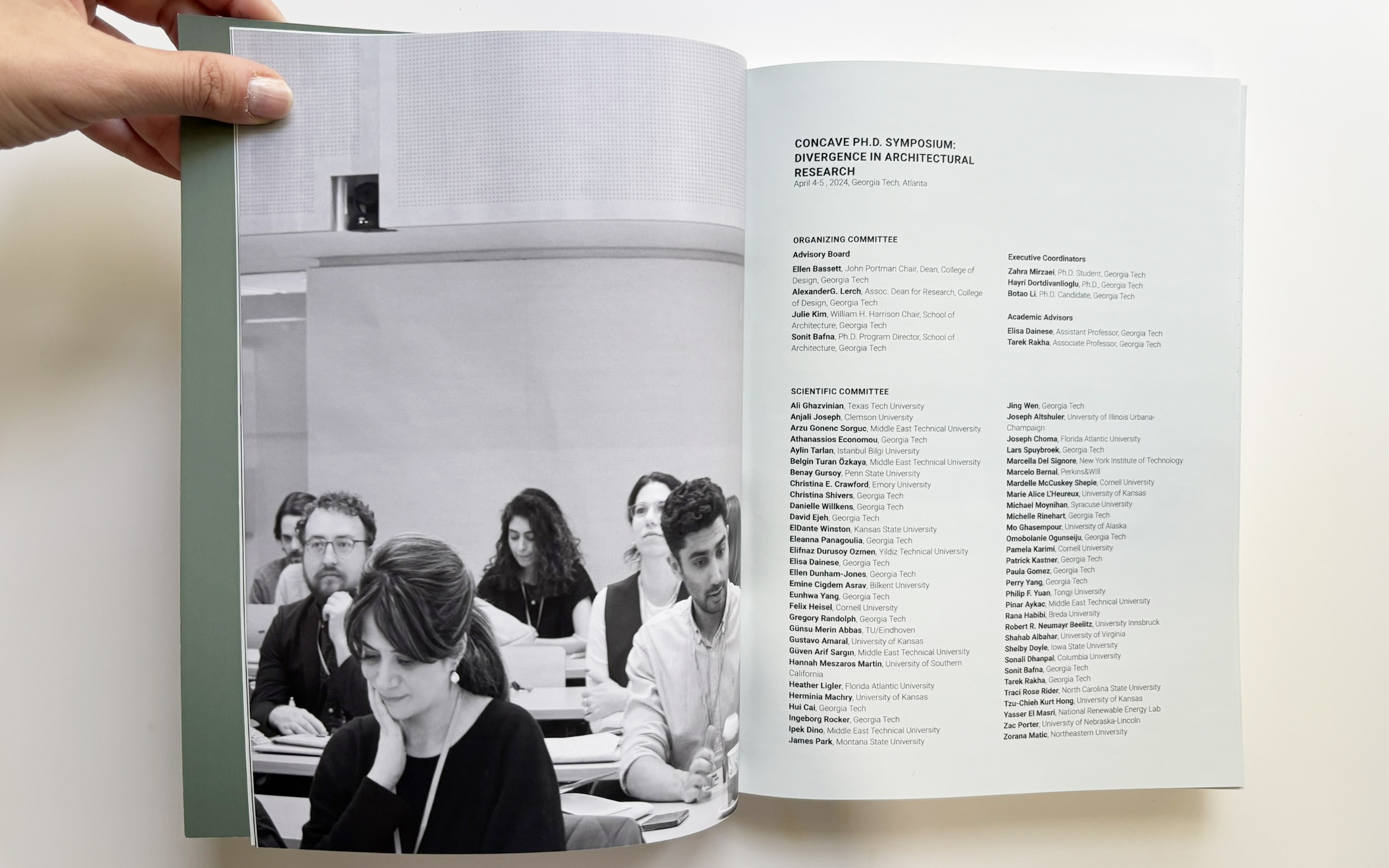
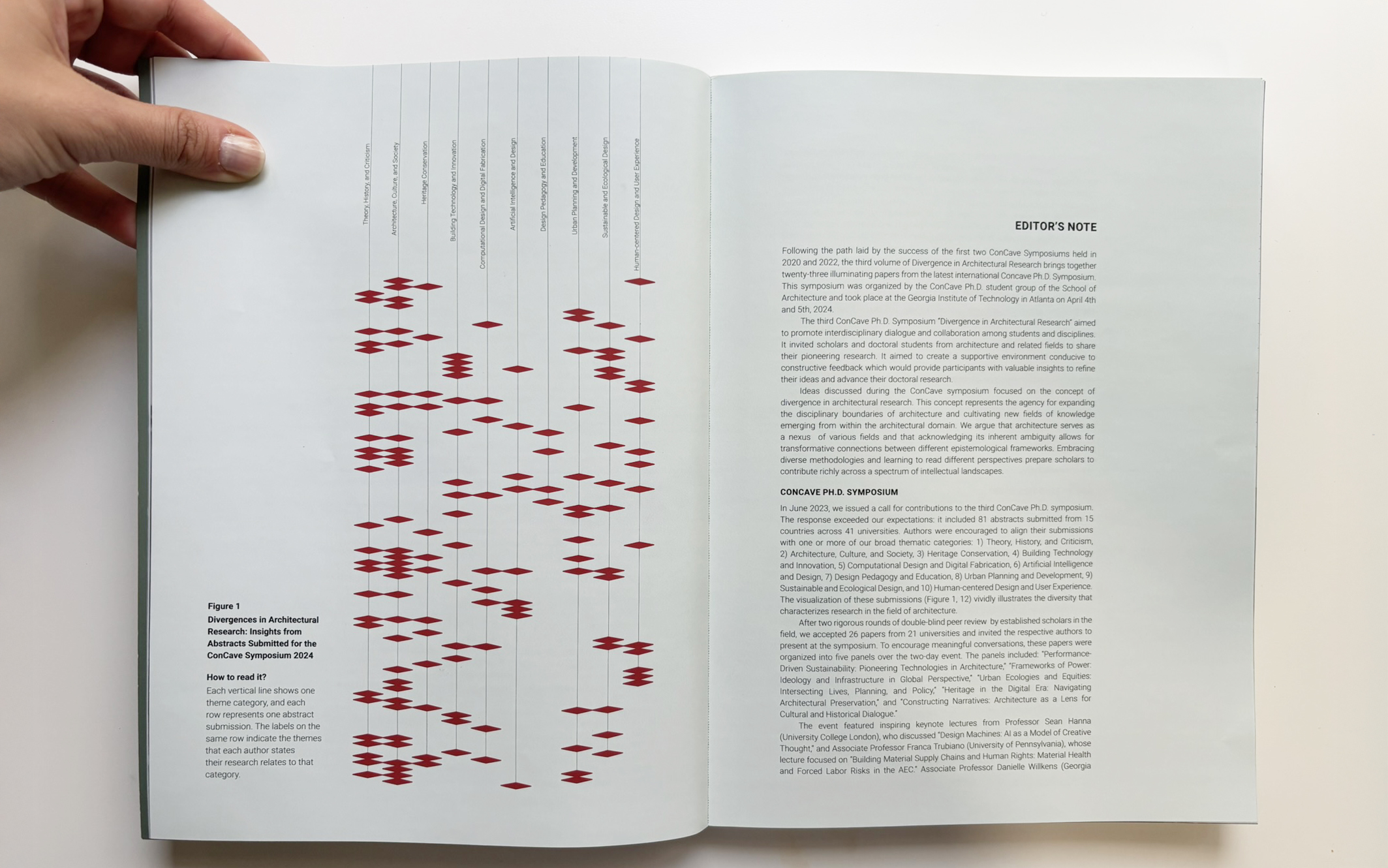
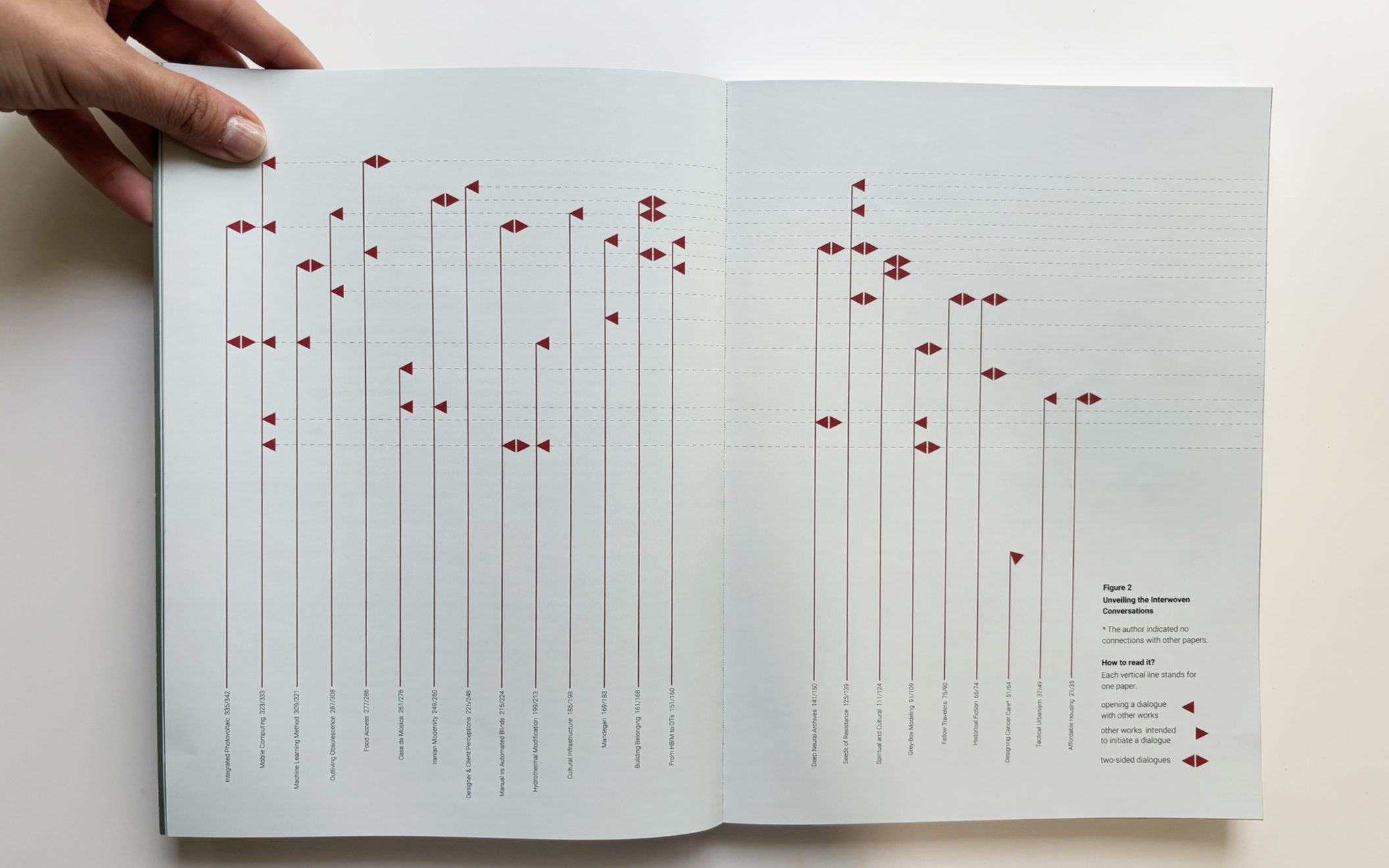
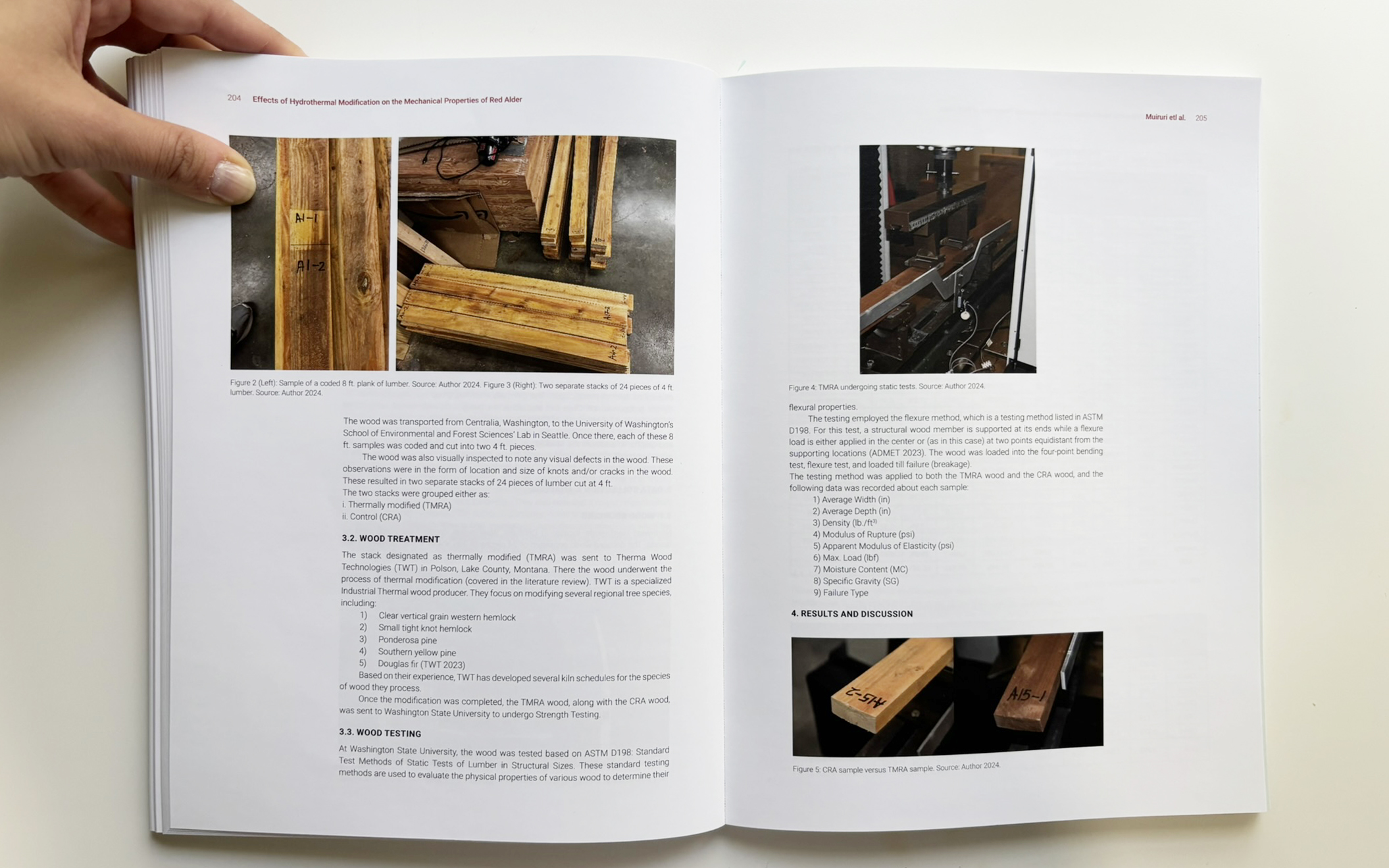
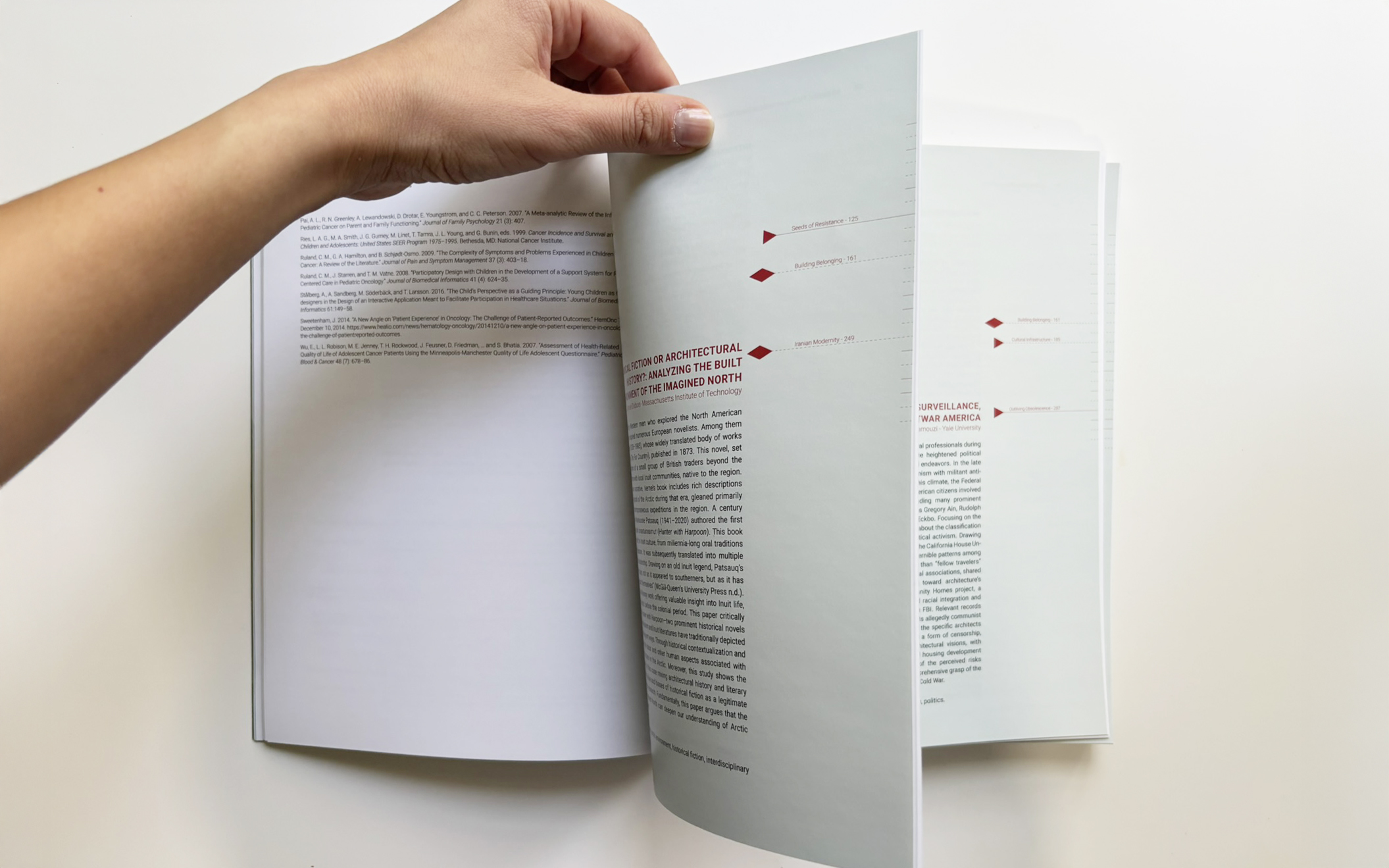
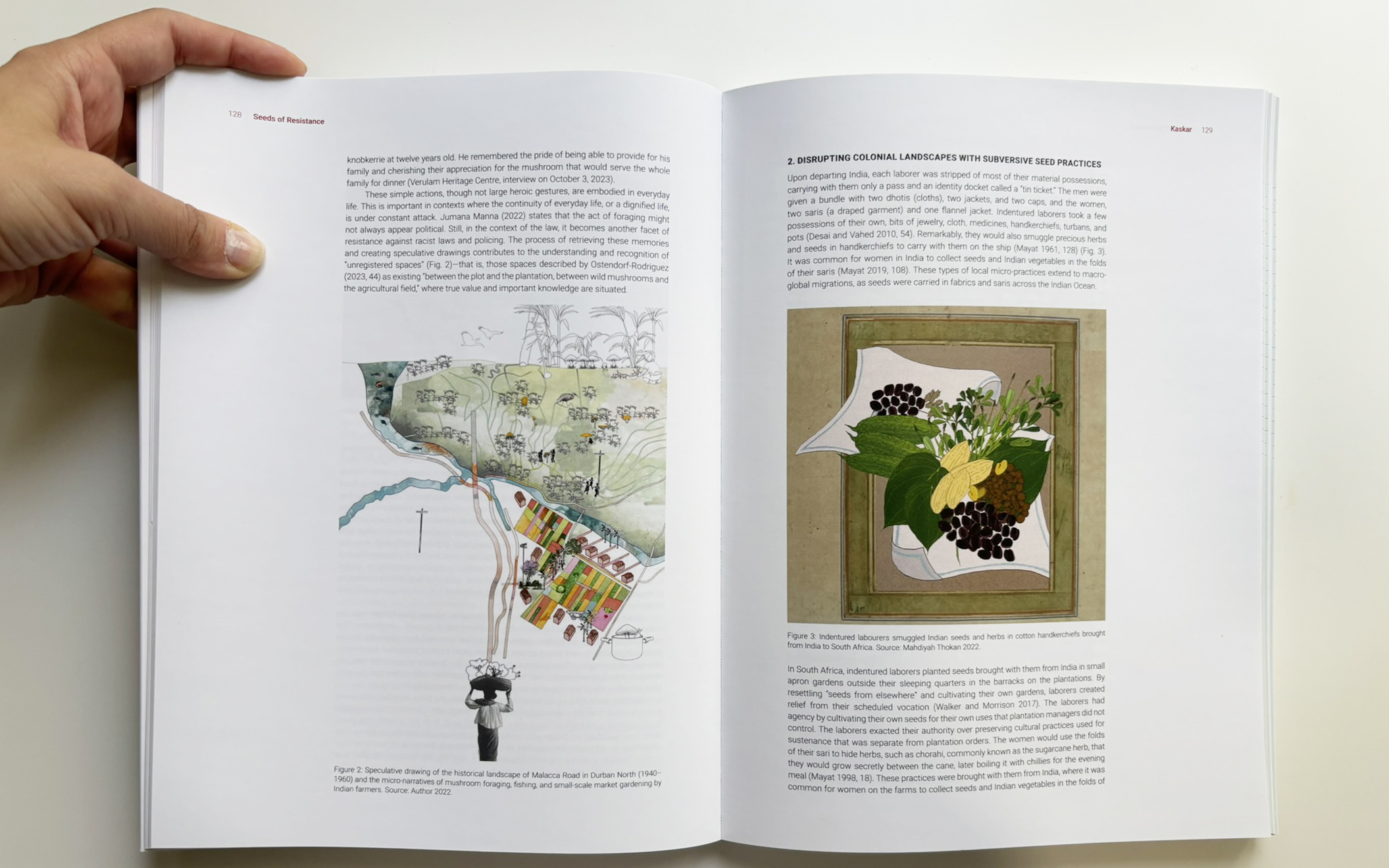
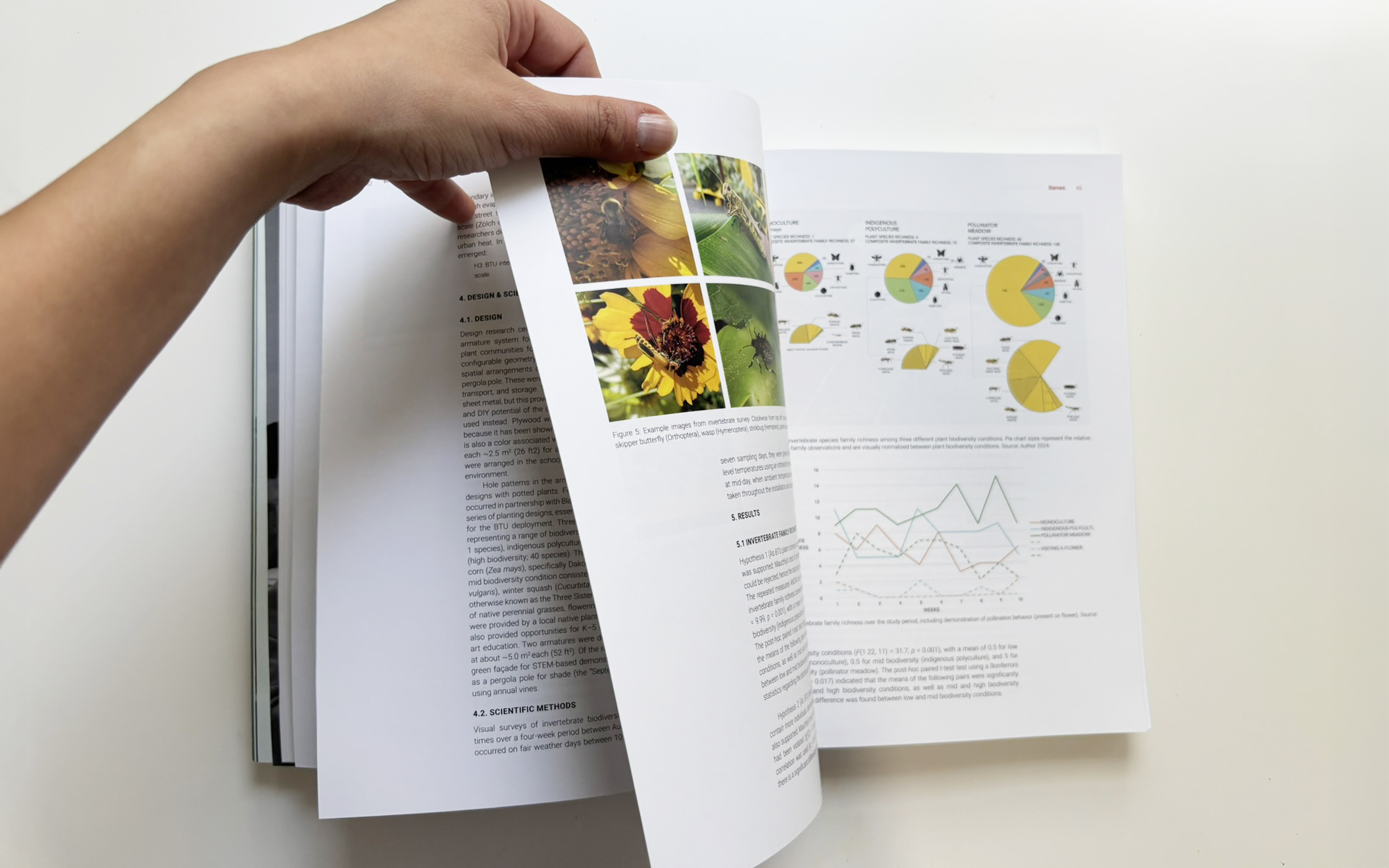
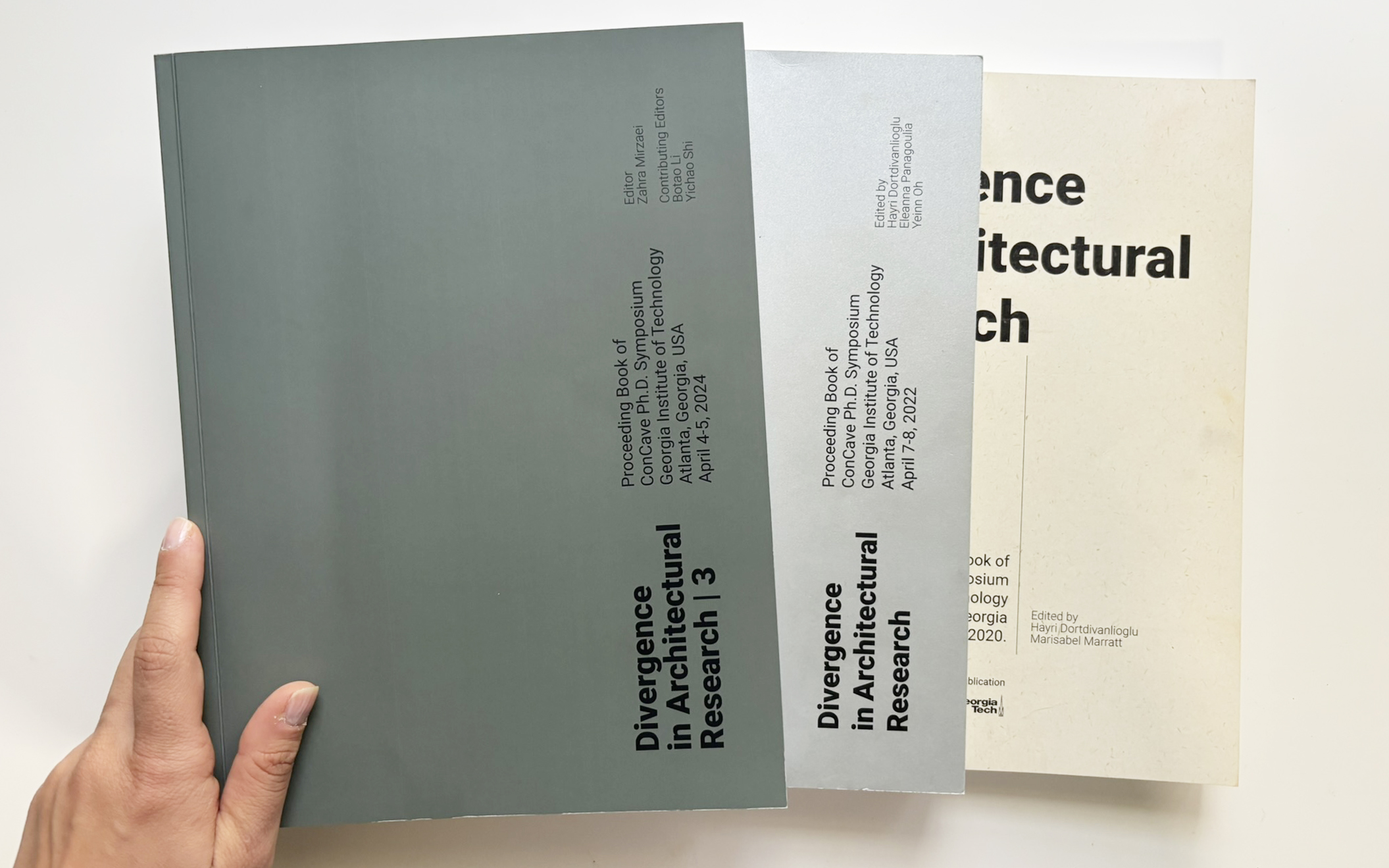
Book Launch:
DIVERGENCE IN ARCHITECTURAL RESEARCH 2025
Proceedings of ConCave Ph.D. Symposium 2024
DOWNLOAD ︎︎︎
Editor:
Zahra Mirzaei
Contributing Editors:
Botao Li
Yichao Shi
School of Architecture Publication
March 2025
ISBN 979-8-9927385-0-6
DOI https://doi.org/10.35090/gatech/77429
DIVERGENCE IN ARCHITECTURAL RESEARCH 2025
Proceedings of ConCave Ph.D. Symposium 2024
DOWNLOAD ︎︎︎
Editor:
Zahra Mirzaei
Contributing Editors:
Botao Li
Yichao Shi
School of Architecture Publication
March 2025
ISBN 979-8-9927385-0-6
DOI https://doi.org/10.35090/gatech/77429
Following the path laid by the success of the first two ConCave Symposiums held in 2020 and 2022, the third volume of Divergence in Architectural Research brings together twenty-three illuminating papers from the latest international ConCave Ph.D. Symposium. This symposium was organized by the ConCave Ph.D. student group of the School of Architecture and took place at the Georgia Institute of Technology in Atlanta on April 4th and 5th, 2024.
The third ConCave Ph.D. Symposium “Divergence in Architectural Research” aimed to promote interdisciplinary dialogue and collaboration among students and disciplines. It invited scholars and doctoral students from architecture and related fields to share their pioneering research. It aimed to create a supportive environment conducive to constructive feedback which would provide participants with valuable insights to refine their ideas and advance their doctoral research.
Ideas discussed during the ConCave symposium focused on the concept of divergence in architectural research. This concept represents the agency for expanding the disciplinary boundaries of architecture and cultivating new fields of knowledge emerging from within the architectural domain. We argue that architecture serves as a nexus of various fields and that acknowledging its inherent ambiguity allows for transformative connections between different epistemological frameworks. Embracing diverse methodologies and learning to read different perspectives prepare scholars to contribute richly across a spectrum of intellectual landscapes.
The ConCave symposium not only sparked dialogue but also cultivated a sense of community among participants. As we prepared the proceedings book, we invited authors to reflect on their experiences and the feedback received throughout the event, and asked them to reflect on how their work resonates with the research presented by others. Through an online inquiry, we encouraged authors to identify two to five papers from the symposium that resonated with their own work—whether confirming, complementing, or offering counterarguments through methodologies, content, or focus areas.
The analysis of their responses revealed an engaging network and dialogue that transcended the thematic categorizations of our panels and enhanced our understanding of the idea of divergence in architecture. This led to numerous and unexpected conversations, with several papers establishing connections with multiple others. Visualized on the book from page 16 to 17 (Figure 2, 16-17), findings highlight how scholarly work in architectural research can foster broader communication and push boundaries across diverse fields. It is through this visualization that we invite our readers to engage in and develop further the conversations and dialogues initiated during the Symposium.
This book has been organized with a focus on the concepts of divergence and dialogue. To prevent any rigid categorization or preconceived notions about papers’ interconnection, we have deliberately arranged the essays in an alphabetic order that follows the authors’ last names. In this way, we invite our readers to explore and navigate the content autonomously, allowing the dialogue and network established by the authors to emerge naturally.
To enhance the reading experience, each paper includes a first page in color that features a graphic guide in the top right corner. A vertical ruler shows the order in which papers appear in the book. A solid line appears when papers present the results of a completed research. A dashed line signifies an ongoing research. When the authors indicated that their work resonates with another paper, opening a dialogue with other works, we present it with a < symbol. Conversely, if other papers aimed to initiate a dialogue with the author’s research, we present those with a > symbol. Two-sided dialogues are represented by a <> symbol .
This graphic guide is designed to inspire our readers to explore the book’s content in a more interactive and engaging way. We suggest that our readers use this guide, folding the first pages to locate key connections and dialogue, and maybe, in further steps, mark the connections that resonate with them using a pen.
Finally, we hope this proceedings book serves as a source of inspiration and sparks meaningful conversations that reach beyond conventional architectural discussions. We are eager to see how these ideas will evolve and reshape architectural research and education through the lens of divergence.
The third ConCave Ph.D. Symposium “Divergence in Architectural Research” aimed to promote interdisciplinary dialogue and collaboration among students and disciplines. It invited scholars and doctoral students from architecture and related fields to share their pioneering research. It aimed to create a supportive environment conducive to constructive feedback which would provide participants with valuable insights to refine their ideas and advance their doctoral research.
Ideas discussed during the ConCave symposium focused on the concept of divergence in architectural research. This concept represents the agency for expanding the disciplinary boundaries of architecture and cultivating new fields of knowledge emerging from within the architectural domain. We argue that architecture serves as a nexus of various fields and that acknowledging its inherent ambiguity allows for transformative connections between different epistemological frameworks. Embracing diverse methodologies and learning to read different perspectives prepare scholars to contribute richly across a spectrum of intellectual landscapes.
The ConCave symposium not only sparked dialogue but also cultivated a sense of community among participants. As we prepared the proceedings book, we invited authors to reflect on their experiences and the feedback received throughout the event, and asked them to reflect on how their work resonates with the research presented by others. Through an online inquiry, we encouraged authors to identify two to five papers from the symposium that resonated with their own work—whether confirming, complementing, or offering counterarguments through methodologies, content, or focus areas.
The analysis of their responses revealed an engaging network and dialogue that transcended the thematic categorizations of our panels and enhanced our understanding of the idea of divergence in architecture. This led to numerous and unexpected conversations, with several papers establishing connections with multiple others. Visualized on the book from page 16 to 17 (Figure 2, 16-17), findings highlight how scholarly work in architectural research can foster broader communication and push boundaries across diverse fields. It is through this visualization that we invite our readers to engage in and develop further the conversations and dialogues initiated during the Symposium.
This book has been organized with a focus on the concepts of divergence and dialogue. To prevent any rigid categorization or preconceived notions about papers’ interconnection, we have deliberately arranged the essays in an alphabetic order that follows the authors’ last names. In this way, we invite our readers to explore and navigate the content autonomously, allowing the dialogue and network established by the authors to emerge naturally.
To enhance the reading experience, each paper includes a first page in color that features a graphic guide in the top right corner. A vertical ruler shows the order in which papers appear in the book. A solid line appears when papers present the results of a completed research. A dashed line signifies an ongoing research. When the authors indicated that their work resonates with another paper, opening a dialogue with other works, we present it with a < symbol. Conversely, if other papers aimed to initiate a dialogue with the author’s research, we present those with a > symbol. Two-sided dialogues are represented by a <> symbol .
This graphic guide is designed to inspire our readers to explore the book’s content in a more interactive and engaging way. We suggest that our readers use this guide, folding the first pages to locate key connections and dialogue, and maybe, in further steps, mark the connections that resonate with them using a pen.
Finally, we hope this proceedings book serves as a source of inspiration and sparks meaningful conversations that reach beyond conventional architectural discussions. We are eager to see how these ideas will evolve and reshape architectural research and education through the lens of divergence.



Book Launch:
DIVERGENCE IN ARCHITECTURAL RESEARCH 2023
Proceedings of ConCave Ph.D. Symposium 2022
Douglas Haskell Award for Student Journals
DOWNLOAD ︎︎︎
Editors:
Hayri Dortdivanlioglu
Eleanna Panagoulia
Yeinn Oh
School of Architecture Publication
January 2023
ISBN 978-1-7364944-1-7
DIVERGENCE IN ARCHITECTURAL RESEARCH 2023
Proceedings of ConCave Ph.D. Symposium 2022
Douglas Haskell Award for Student Journals
DOWNLOAD ︎︎︎
Editors:
Hayri Dortdivanlioglu
Eleanna Panagoulia
Yeinn Oh
School of Architecture Publication
January 2023
ISBN 978-1-7364944-1-7
We are excited to announce that our publication, "Divergence in Architectural Research," has been awarded the prestigious Douglas Haskell Award for Student Journals. This award supports student journalism on architecture, planning, and related subjects, encouraging intellectual criticism among emerging professionals.
This second volume of Divergence in Architectural Research brings together nineteen papers presented at the ConCave Ph.D. Symposium 2022, which took place at the Georgia Institute of Technology, Atlanta, Georgia on April 7-8, 2022. This international doctorate symposium was organized by the ConCave Ph.D. Student Group under the auspices of the School of Architecture and the College of Design at the Georgia Institute of Technology. The symposium sought to create a platform for sharing current research in architecture, with invited scholars and other doctoral students from architecture and allied fields. It was our desire to create an opportunity to gather, exchange formal as well as spontaneous conversations in research, and explore possibilities of collaboration.
Right after the first ConCave Ph.D. Symposium in mid-March of 2020, like the entire world we found ourselves following planetary regulations and procedures dictated by the Covid-19 Pandemic. While the success of the first symposium raised the bar for the next event, besides our ambitions, we had to tackle with the daunting task of bringing Ph.D. scholars together during an on-going world health emergency. While in the last two years we learnt more about how to control and fight the disease, we were not certain about the possibility of an in-person symposium considering the emerging variants and the limited distribution of the vaccines only in some privileged regions of the world. The pandemic made the inequities and the issues of access to resources more visible in every aspect of human life, but more so in our Ph.D. community.
The isolation during the peak of the pandemic proved the necessity and importance of the ConCave Ph.D. Group and the Ph.D. Symposium. On the one hand, it showed us the value of belonging to a community and having a safe space to get together and interact with our peers and friends. On the other hand, the inequities emerging after Covid-19 compelled us to reimagine the structure of the symposium. In addition to physical gathering made possible by adoption of precautions, such as vaccination, mask wearing, and regular rapid Covid-19 testing, we offered a virtual space, in which the presenters and participants from all over the world followed the symposium and interacted with the other participants.
This second volume of Divergence in Architectural Research brings together nineteen papers presented at the ConCave Ph.D. Symposium 2022, which took place at the Georgia Institute of Technology, Atlanta, Georgia on April 7-8, 2022. This international doctorate symposium was organized by the ConCave Ph.D. Student Group under the auspices of the School of Architecture and the College of Design at the Georgia Institute of Technology. The symposium sought to create a platform for sharing current research in architecture, with invited scholars and other doctoral students from architecture and allied fields. It was our desire to create an opportunity to gather, exchange formal as well as spontaneous conversations in research, and explore possibilities of collaboration.
Right after the first ConCave Ph.D. Symposium in mid-March of 2020, like the entire world we found ourselves following planetary regulations and procedures dictated by the Covid-19 Pandemic. While the success of the first symposium raised the bar for the next event, besides our ambitions, we had to tackle with the daunting task of bringing Ph.D. scholars together during an on-going world health emergency. While in the last two years we learnt more about how to control and fight the disease, we were not certain about the possibility of an in-person symposium considering the emerging variants and the limited distribution of the vaccines only in some privileged regions of the world. The pandemic made the inequities and the issues of access to resources more visible in every aspect of human life, but more so in our Ph.D. community.
The isolation during the peak of the pandemic proved the necessity and importance of the ConCave Ph.D. Group and the Ph.D. Symposium. On the one hand, it showed us the value of belonging to a community and having a safe space to get together and interact with our peers and friends. On the other hand, the inequities emerging after Covid-19 compelled us to reimagine the structure of the symposium. In addition to physical gathering made possible by adoption of precautions, such as vaccination, mask wearing, and regular rapid Covid-19 testing, we offered a virtual space, in which the presenters and participants from all over the world followed the symposium and interacted with the other participants.


Book Launch:
DIVERGENCE IN ARCHITECTURAL RESEARCH 2021
Proceedings of ConCave Ph.D. Symposium 2020
DOWNLOAD ︎︎︎
Editors:
Hayri Dortdivanlioglu
Marisabel Marratt
School of Architecture Publication
January 2021
ISBN 978-0-9615650-1-5
DIVERGENCE IN ARCHITECTURAL RESEARCH 2021
Proceedings of ConCave Ph.D. Symposium 2020
DOWNLOAD ︎︎︎
Editors:
Hayri Dortdivanlioglu
Marisabel Marratt
School of Architecture Publication
January 2021
ISBN 978-0-9615650-1-5
The essays in this volume have come together under the theme “Divergence in Architectural Research” and present a snapshot of Ph.D. research being conducted in over thirty architectural research institutions, representing fourteen countries around the world. These essays also provide a window into the presentations and discussions that took place March 5-6, 2020, during the ConCave Ph.D. Symposium “Divergence in Architectural Research,” under the auspices of the School of Architecture, Georgia Institute of Technology, in Atlanta, Georgia.
On a preliminary reading, the essays respond to the call of divergence by doing just that; they present the great diversity of research topics, methodologies, and practices currently found under the umbrella of “architectural research.” They inform inquiry within architectural programs and across disciplinary concentrations, and also point to the ways that the academy, research methodologies, and the design profession are evolving and encroaching upon one another, with the unspoken hope of encouraging new relationships, reconfiguring previous assumptions about the discipline, and interweaving research and practice.The research that follows does not seek to define divergence; in fact, it is easier to say what it is not than what it is. For example, divergence is not synonymous with inter-disciplinarity, which emphasizes a sharing across established boundaries. Inter-disciplinarity seeks resemblances and shared methods and motivations, ignoring all the rest.
The search for sameness usually remains on the surface; it is unsustainable over a long- term and ultimately not very effective for investigating the breadth and depth of a discipline. Rather, from within architecture, the projects that follow choose to explore subjects, techniques, and methodologies that diverge, sometimes intentionally, sometimes organically, from the canon of research in architecture. In doing so, they expand the field of exploration and also point to how this canon, once privileged as a means of ordering and defining a distinct cultural and professional identity, may also have inadvertently reduced the subject’s active, living quality–architecture’s agency. These essays take architecture’s agency as primordial, with its variations, energies, and movements, and allow it to shape the course of their research program, their conclusions, and their speculations for the future of research in architecture.
On a preliminary reading, the essays respond to the call of divergence by doing just that; they present the great diversity of research topics, methodologies, and practices currently found under the umbrella of “architectural research.” They inform inquiry within architectural programs and across disciplinary concentrations, and also point to the ways that the academy, research methodologies, and the design profession are evolving and encroaching upon one another, with the unspoken hope of encouraging new relationships, reconfiguring previous assumptions about the discipline, and interweaving research and practice.The research that follows does not seek to define divergence; in fact, it is easier to say what it is not than what it is. For example, divergence is not synonymous with inter-disciplinarity, which emphasizes a sharing across established boundaries. Inter-disciplinarity seeks resemblances and shared methods and motivations, ignoring all the rest.
The search for sameness usually remains on the surface; it is unsustainable over a long- term and ultimately not very effective for investigating the breadth and depth of a discipline. Rather, from within architecture, the projects that follow choose to explore subjects, techniques, and methodologies that diverge, sometimes intentionally, sometimes organically, from the canon of research in architecture. In doing so, they expand the field of exploration and also point to how this canon, once privileged as a means of ordering and defining a distinct cultural and professional identity, may also have inadvertently reduced the subject’s active, living quality–architecture’s agency. These essays take architecture’s agency as primordial, with its variations, energies, and movements, and allow it to shape the course of their research program, their conclusions, and their speculations for the future of research in architecture.